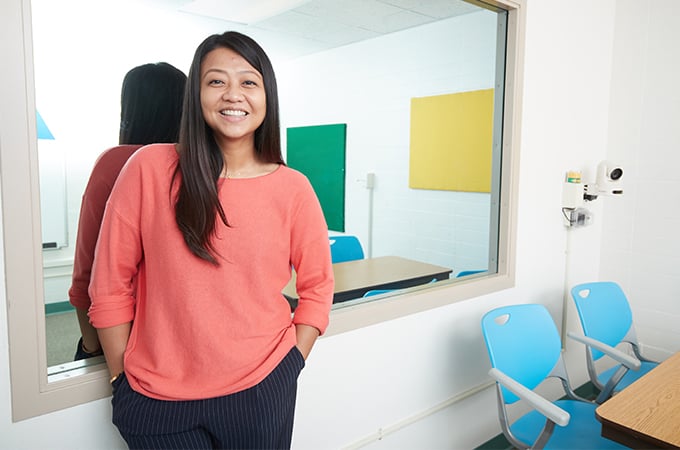Sally Cantos ’20 was introduced to the profession of speech-language pathology through her sister who works in a rehabilitation clinic. Soon after, one of her family members was diagnosed with autism spectrum disorder (ASD), also benefiting from speech-language therapy—and Cantos knew the field was for her.
Cantos, who received bachelor’s and master’s degrees in the Philippines before moving to the United States, was attracted to the “grad plus” track in the communication sciences and disorders program at the University of Redlands. This track, which accepts students who didn’t study speech-language pathology as undergraduate students, allowed Cantos to enter the program by taking prerequisite classes that count towards her master’s degree.
Before moving to the United States, Cantos didn’t know what the speech therapy field consisted of. “All of a sudden, I was introduced to both sides of the practice—the medical [through my sister’s clinic] and the educational [through my family member’s ASD diagnosis],” she says. “I thought it was really interesting.”
Cantos commutes weekly to Redlands from Ventura, so she savors her time on campus and with professors. The numerous clinics within the program have enabled her to glean insights into the profession of speech-language pathology in a small group setting. Currently, Cantos is enrolled in the dysphagia clinic at Redlands Community Hospital, where she helps patients with swallowing disorders.
“I’m interested in the medical aspect of speech-language pathology, so receiving this kind of education that allows me to apply it to a clinic is incredible,” says Cantos. “I can really see the relevance of what I’m learning with real-life practice.”
In addition to learning about helping patients, Cantos admits she has also learned a few things about herself. Due to the different patient populations that are part of the clinical side of the program, Cantos found herself working with children at a local nursery school—something she never thought she wanted to do. But now, she says she’s open to the possibility of working with young children in the school environment.
Additionally, Cantos notes the importance of the program’s emphasis on diversity and multicultural education: “The patients that speech-language pathologists work with can come from a variety of backgrounds.”
After she graduates, Cantos is looking forward to working as a medical speech-language pathologist serving patients who have experienced neurological disorders, such as a stroke, Parkinson’s disease, traumatic brain injuries, and other neurological events. She credits the U of R with giving her the confidence to do so.
“I learned that I’m capable of developing professional empathy by working directly with clients,” she says. “I really value the immersive educational experience I received.”
Learn more about the communication sciences and disorders program at the University of Redlands.






